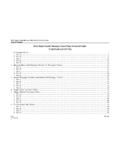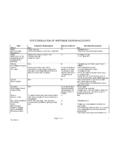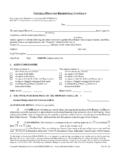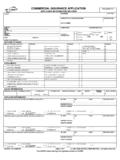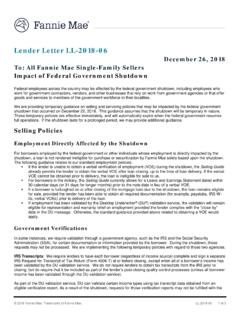Transcription of FEDERAL BILL OF LADING ACT - gdofgroup.weebly.com
1 FEDERAL bill OF LADING ACT. 49 80101 80116. 80101. Definitions 80102. Application 80103. Negotiable and nonnegotiable bills 80104. Form and requirements for negotiation 80105. Title and rights affected by negotiation 80106. Transfer without negotiation 80107. Warranties and liability 80108. Alterations and additions 80109. Liens under negotiable bills 80110. Duty to deliver goods 80111. Liability for delivery of goods 80112. Liability under negotiable bills issued in parts, sets, or duplicates 80113. Liability for nonreceipt, misdescription, and improper loading 80114. Lost, stolen, and destroyed negotiable bills 80115. Limitation on use of judicial process to obtain possession of goods from common carriers 80116. Criminal penalty 80101. Definitions In this chapter-- (1) "consignee" means the person named in a bill of LADING as the person to whom the goods are to be delivered. (2) "consignor" means the person named in a bill of LADING as the person from whom the goods have been received for shipment.
2 (3) "goods" means merchandise or personal property that has been, is being, or will be transported. (4) "holder" means a person having possession of, and a property right in, a bill of LADING . (5) "order" means an order by indorsement on a bill of LADING . (6) "purchase" includes taking by mortgage or pledge. 80102. Application This chapter applies to a bill of LADING when the bill is issued by a common carrier for the transportation of goods-- (1) between a place in the District of Columbia and another place in the District of Columbia;. (2) between a place in a territory or possession of the United States and another place in the same territory or possession;. (3) between a place in a State and a place in another State;. 1. (4) between a place in a State and a place in the same State through another State or a foreign country; or (5) from a place in a State to a place in a foreign country. 80103. Negotiable and nonnegotiable bills (a) Negotiable bills.
3 (1) A bill of LADING is negotiable if the bill -- (A) states that the goods are to be delivered to the order of a consignee; and (B) does not contain on its face an agreement with the shipper that the bill is not negotiable. (2) Inserting in a negotiable bill of LADING the name of a person to be notified of the arrival of the goods-- (A) does not limit its negotiability; and (B) is not notice to the purchaser of the goods of a right the named person has to the goods. (b) Nonnegotiable bills.. (1) A bill of LADING is nonnegotiable if the bill states that the goods are to be delivered to a consignee. The indorsement of a nonnegotiable bill does not-- (A) make the bill negotiable; or (B) give the transferee any additional right. (2) A common carrier issuing a nonnegotiable bill of LADING must put "nonnegotiable" or "not negotiable" on the bill . This paragraph does not apply to an informal memorandum or acknowledgment. 80104.
4 Form and requirements for negotiation (a) General rules.. (1) A negotiable bill of LADING may be negotiated by indorsement. An indorsement may be made in blank or to a specified person. If the goods are deliverable to the order of a specified person, then the bill must be indorsed by that person. (2) A negotiable bill of LADING may be negotiated by delivery when the common carrier, under the terms of the bill , undertakes to deliver the goods to the order of a specified person and that person or a subsequent indorsee has indorsed the bill in blank. (3) A negotiable bill of LADING may be negotiated by a person possessing the bill , regardless of the way in which the person got possession, if-- 2. (A) a common carrier, under the terms of the bill , undertakes to deliver the goods to that person; or (B) when the bill is negotiated, it is in a form that allows it to be negotiated by delivery. (b) Validity not validity of a negotiation of a bill of LADING is not affected by the negotiation having been a breach of duty by the person making the negotiation, or by the owner of the bill having been deprived of possession by fraud, accident, mistake, duress, loss, theft, or conversion, if the person to whom the bill is negotiated, or a person to whom the bill is subsequently negotiated, gives value for the bill in good faith and without notice of the breach of duty, fraud, accident, mistake, duress, loss, theft, or conversion.
5 (c) Negotiation by seller, mortgagor, or pledgor to person without When goods for which a negotiable bill of LADING has been issued are in a common carrier's possession, and the person to whom the bill has been issued retains possession of the bill after selling, mortgaging, or pledging the goods or bill , the subsequent negotiation of the bill by that person to another person receiving the bill for value, in good faith, and without notice of the prior sale, mortgage, or pledge has the same effect as if the first purchaser of the goods or bill had expressly authorized the subsequent negotiation. 80105. Title and rights affected by negotiation (a) a negotiable bill of LADING is negotiated-- (1) the person to whom it is negotiated acquires the title to the goods that-- (A) the person negotiating the bill had the ability to convey to a purchaser in good faith for value; and (B) the consignor and consignee had the ability to convey to such a purchaser; and (2) the common carrier issuing the bill becomes obligated directly to the person to whom the bill is negotiated to hold possession of the goods under the terms of the bill the same as if the carrier had issued the bill to that person.
6 (b) Superiority of a negotiable bill of LADING is negotiated to a person for value in good faith, that person's right to the goods for which the bill was issued is superior to a seller's lien or to a right to stop the transportation of the goods. This subsection applies whether the negotiation is made before or after the common carrier issuing the bill receives notice of the seller's claim. The carrier may deliver the goods to an unpaid seller only if the bill first is surrendered for cancellation. (c) Mortgagee and lien holder rights not as provided in subsection (b) of this section, this chapter does not limit a right of a mortgagee or lien holder having a mortgage or lien on goods against a person that purchased for value in good faith from the owner, and got possession of the goods immediately before delivery to the common carrier. 80106. Transfer without negotiation (a) Delivery and holder of a bill of LADING may transfer the bill without negotiating it by delivery and agreement to transfer title to the bill or to the goods represented 3.
7 By it. Subject to the agreement, the person to whom the bill is transferred has title to the goods against the transferor. (b) Compelling a negotiable bill of LADING is transferred for value by delivery without being negotiated and indorsement of the transferor is essential for negotiation, the transferee may compel the transferor to indorse the bill unless a contrary intention appears. The negotiation is effective when the indorsement is made. (c) Effect of notification.. (1) When a transferee notifies the common carrier that a nonnegotiable bill of LADING has been transferred under subsection (a) of this section, the carrier is obligated directly to the transferee for any obligations the carrier owed to the transferor immediately before the notification. However, before the carrier is notified, the transferee's title to the goods and right to acquire the obligations of the carrier may be defeated by-- (A) garnishment, attachment, or execution on the goods by a creditor of the transferor; or (B) notice to the carrier by the transferor or a purchaser from the transferor of a later purchase of the goods from the transferor.
8 (2) A common carrier has been notified under this subsection only if-- (A) an officer or agent of the carrier, whose actual or apparent authority includes acting on the notification, has been notified; and (B) the officer or agent has had time, exercising reasonable diligence, to communicate with the agent having possession or control of the goods. 80107. Warranties and liability (a) General a contrary intention appears, a person negotiating or transferring a bill of LADING for value warrants that-- (1) the bill is genuine;. (2) the person has the right to transfer the bill and the title to the goods described in the bill ;. (3) the person does not know of a fact that would affect the validity or worth of the bill ; and (4) the goods are merchantable or fit for a particular purpose when merchantability or fitness would have been implied if the agreement of the parties had been to transfer the goods without a bill of LADING .
9 (b) Security for person holding a bill of LADING as security for a debt and in good faith demanding or receiving payment of the debt from another person does not warrant by the demand or receipt-- (1) the genuineness of the bill ; or (2) the quantity or quality of the goods described in the bill . 4. (c) common carrier issuing a bill of LADING , on the face of which is the word "duplicate" or another word indicating that the bill is not an original bill , is liable the same as a person that represents and warrants that the bill is an accurate copy of an original bill properly issued. The carrier is not otherwise liable under the bill . (d) Indorser of a bill of LADING does not make the indorser liable for failure of the common carrier or a previous indorser to fulfill its obligations. 80108. Alterations and additions An alteration or addition to a bill of LADING after its issuance by a common carrier, without authorization from the carrier in writing or noted on the bill , is void.
10 However, the original terms of the bill are enforceable. 80109. Liens under negotiable bills A common carrier issuing a negotiable bill of LADING has a lien on the goods covered by the bill for-- (1) charges for storage, transportation, and delivery (including demurrage and terminal charges), and expenses necessary to preserve the goods or incidental to transporting the goods after the date of the bill ; and (2) other charges for which the bill expressly specifies a lien is claimed to the extent the charges are allowed by law and the agreement between the consignor and carrier. 80110. Duty to deliver goods (a) General to the extent a common carrier establishes an excuse provided by law, the carrier must deliver goods covered by a bill of LADING on demand of the consignee named in a nonnegotiable bill or the holder of a negotiable bill for the goods when the consignee or holder-- (1) offers in good faith to satisfy the lien of the carrier on the goods.
